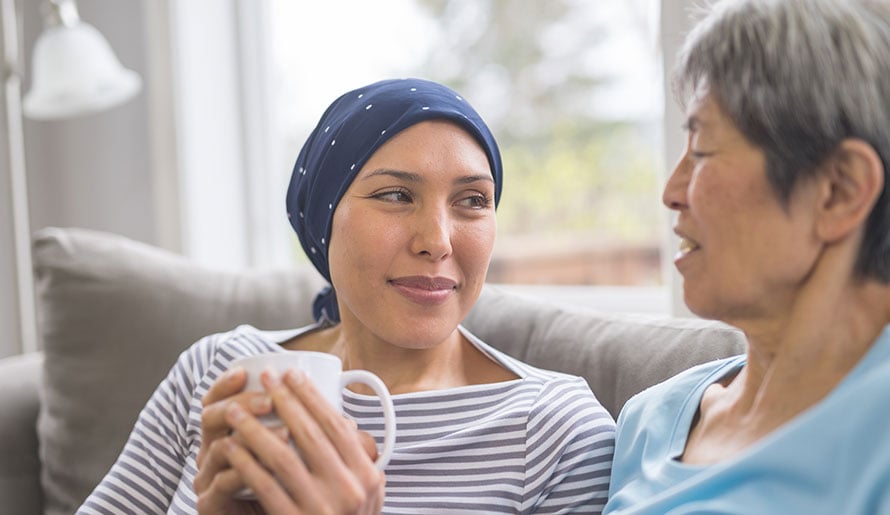Inflammatory Breast Cancer Survival Rate

The inflammatory breast cancer survival rate is sometimes used as a standard way for physicians and researchers to discuss a patient’s prognosis. While some patients find this information helpful, others do not, so learning about survival rates is largely a matter of personal preference.
What exactly does "survival rate" mean?
A survival rate provides a general idea of what percentage of people with the same type and stage of cancer are alive a certain amount of time after they were diagnosed. For instance, the five-year survival rate indicates the percentage of people who are alive at least five years after their cancer was diagnosed.
Keep in mind that a survival rate is an estimate only; usually, it is based on previous outcomes of a large number of people who had a specific type of cancer. It is notable that cancer treatment is continually improving, and many of the people whose outcomes factor into various survival rates did not have access to treatments that are widely available today.
What’s more, no single patient can be considered average, and it is impossible to predict what will happen in any individual case. Many patients experience much better outcomes than the survival rate suggests. Additionally, there are many factors that the survival rate does not take into account, including risk factors that can influence a patient’s outcome.
For these reasons, survival rate statistics can be confusing and may lead to more questions than answers. The best way to understand the inflammatory breast cancer survival rate is to talk with a physician who is familiar with your situation and can explain how the numbers may apply to you.
Why does the survival rate for inflammatory breast cancer differ from the survival rate for other types of breast cancer?
The first noticeable signs of inflammatory breast cancer are markedly different than those of other types of breast cancer. Instead of producing a breast lump, inflammatory breast cancer tends to cause the breast to become swollen, red and tender, often in a matter of days or weeks. These symptoms are caused not by inflammation but by cancer cells blocking lymph vessels in the skin and soft tissues. The hallmark sign is breast skin dimpling and redness, a distinct phenomenon known as peau d’orange, which is French for “the skin of an orange.” Indeed, inflammatory breast cancer can make the breast skin seem similar in texture to that of an orange peel.
By the time the symptoms of inflammatory breast cancer become noticeable, the cancer cells have usually progressed into the skin, so the malignancy is often diagnosed at stage 3 or stage 4. It also tends to affect younger women (under age 40), and it grows and spreads more quickly than other types of breast cancer.
Finally, because inflammatory breast cancer accounts for only a small percentage of breast cancers (an estimated 1% to 5% of all breast cancers in the United States), there is less general awareness about its symptoms, and it receives less attention from researchers. For instance, unlike other types of breast cancer, no targeted therapies have been developed yet for inflammatory breast cancer. All of these factors can affect the inflammatory breast cancer survival rate.
Can the survival rate for inflammatory breast cancer be improved?
Researchers have identified several factors that can influence the survival rate of an inflammatory breast cancer patient. These include:
- Early detection
- Aggressive treatment, such as surgery, chemotherapy and radiation therapy
- The patient’s overall health and wellness
Turn to Moffitt Cancer Center for compassionate care and reliable answers
If you have questions about the general inflammatory breast cancer survival rate or your individual risk profile, Moffitt Cancer Center is here to help. As the only National Cancer Institute-designated Comprehensive Cancer Center based in Florida, we are proud to be firmly positioned at the forefront of cancer research. We offer our patients the very latest in treatment options, including clinical trials, along with the comprehensive care and compassionate support they need to achieve the best possible outcome and quality of life.
To request an appointment with a cancer expert in our renowned Don & Erika Wallace Comprehensive Breast Program, complete our new patient registration form online or call 1-888-663-3488. A referral is not required. At Moffitt, you are a top priority of a cancer center that delivers nationally ranked care in new and transformative ways.
References
American Society of Clinical Oncology (ASCO) – Breast Cancer: Inflammatory – Statistics
American Cancer Society – Survival Rates for Breast Cancer
